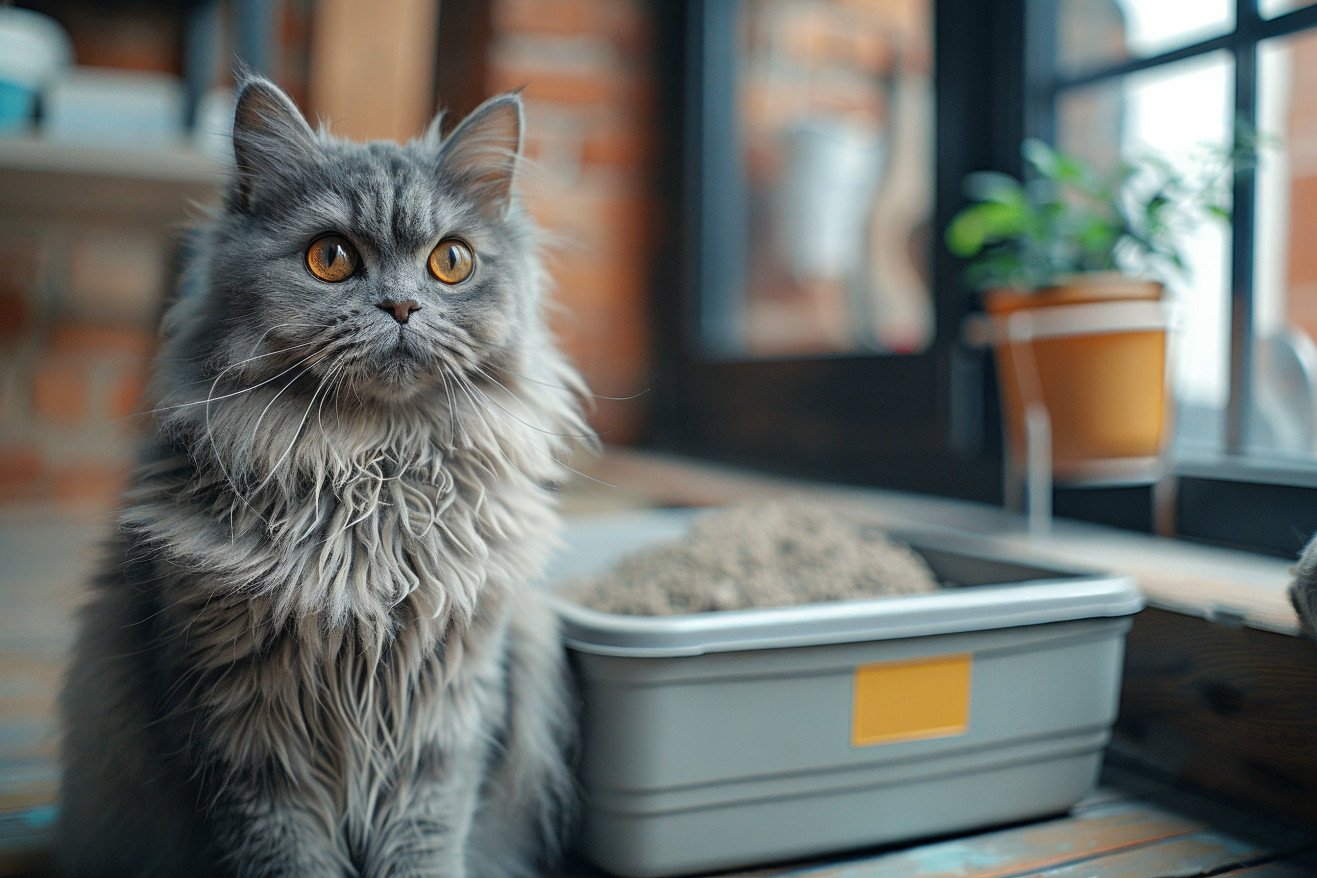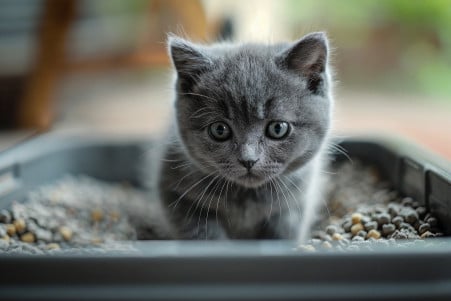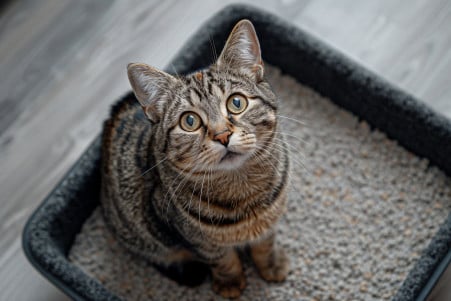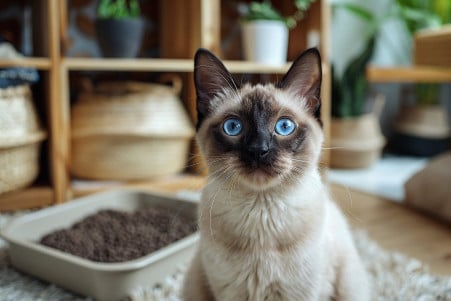How Often Do Cats Pee? Understanding Feline Urination Frequency
14 May 2024 • Updated 14 May 2024

If you've ever wondered how often you should expect your cat to go to the bathroom, you're not alone. On average, cats urinate between 2-4 times a day, but some cats may urinate as many as 6-8 times a day. The frequency of urination is also a good way to gauge how much your cat is drinking. While the average is 2-4 times a day, if your cat is urinating more or less than this, it could be a sign of a health problem that needs to be addressed by a vet.
In this article, we'll take a deep dive into the research on how often cats pee and the health of their urinary tracts. This will help you understand what's normal, what's not, and what to look for in terms of urinary health in your cat. We'll also cover how you can help your cat maintain a healthy urinary system. By learning about these natural processes and what's typical for cats, you'll be better prepared to care for your cat and know when to seek medical attention.
How often do cats pee?
Things That Impact How Often Cats Pee
There are many things that can impact how often cats pee, from biological factors like age and health to lifestyle factors like diet and stress. As PetMD explains, cats tend to pee more frequently as they get older, especially if they develop health problems like diabetes or kidney disease. On the other hand, kittens pee more often than adult cats.
Some health issues can directly impact how often a cat pees. As Catster points out, urinary tract infections, bladder stones, or inflammation can cause pain and discomfort that leads to frequent urination in small amounts. On the other hand, kidney disease can cause a cat to pee less.
Diet can also play a role. PetHealthNetwork says that cats that eat wet food tend to pee more than cats that eat dry food because wet food has a higher water content.
Stressors in a cat's environment, like changes in their routine, a lack of access to a litter box, or the presence of other animals, can also impact how often a cat pees. Stress and anxiety can even lead some cats to stop using their litter box.
Finally, while the impact of breed and sex on how often cats pee is relatively small, these factors can also impact how often an individual cat pees. By being aware of these factors, you can better notice when your cat's peeing habits change, which can be a sign of a problem that needs to be addressed.
How to Tell If Your Cat Has a Urinary Issue
According to Catster, sudden or gradual increases in urination frequency, a condition known as polyuria, can be a sign of underlying health issues such as diabetes or kidney disease. On the other hand, decreases in urination frequency, or oliguria, can be a sign of a urinary tract obstruction or another medical emergency that requires immediate veterinary care.
Changes in urine color, odor, or the presence of blood can be signs of urinary tract infections or other urinary issues, according to PetHealthNetwork. Straining or vocalizing during urination, as well as excessive licking of the genital area, can be signs of discomfort or pain during urination.
Changes in behavior such as litter box avoidance or inappropriate elimination can also be signs of a urinary health issue, according to PetMD. It’s important to know these signs and seek veterinary care if you notice them so that urinary issues can be addressed before they become more serious.
Reasons for Litter Box Avoidance
According to the Spring Creek Animal Hospital, medical problems like urinary tract infections, bladder stones, or kidney disease can cause cats to avoid the litter box because urination is painful or uncomfortable. Meanwhile, the PetMD explains that stress, anxiety, or changes in the home can cause litter box aversion in some cats.
Issues with the litter box, like not cleaning it often enough or using a litter that has a strong scent, can cause cats to avoid the litter box, according to The Spruce Pets. The location, size, and type of the litter box can also cause litter box problems if they don't meet the cat's needs.
Territorial marking or spraying, which is often caused by stress or the presence of other cats, can cause cats to eliminate outside the litter box, according to the Spring Creek Animal Hospital. It's important to address the medical or behavioral issues that are causing the problem in order to resolve litter box avoidance and ensure that the cat and its owners have a clean, stress-free environment.
Litter Box Training and Management Strategies
Proper litter box training early in life can help kittens develop good elimination behaviors and avoid future problems, says Four Paws. Having enough litter boxes—ideally one per cat plus one extra—and placing them in low-traffic areas can also help encourage regular litter box use, according to the SPCA of British Columbia.
Other tips for success include using unscented, clumping litter and scooping the litter boxes at least once a day, says Hill's Pet Nutrition. Meanwhile, reducing stress in the cat's environment, such as that caused by changes in the household or the presence of other animals, can also help reduce litter box problems, says Spring Creek Animal Hospital.
If litter box problems persist, it may be necessary to work with a veterinarian or animal behaviorist to determine and treat any medical or behavioral issues that may be contributing to the problem, according to all of the expert sources. By following these tips, cat owners can help ensure their pets maintain good, healthy litter box habits.
How to Clean and Remove Cat Pee Smell
Because bacteria can cause the smell of cat urine to become more pungent over time, it's important to act fast when cleaning up after your cat, according to COIT. To avoid stains and smells, make sure to blot the area as much as possible before cleaning it up, says PetMD.
Enzyme-based cleaners, as well as solutions made from baking soda and vinegar, can be used to break down and neutralize the smell of cat urine on a variety of surfaces, according to The Vets. When it comes to carpets and fabrics, using a wet/dry vacuum or steam cleaner after applying a cleaning solution can help ensure that the stain and smell are removed, says COIT.
If the urine has soaked through to the carpet pad or subfloor, you may need to hire a professional carpet cleaning service to remove the smell, according to PetMD. By using these methods to clean and remove the smell of cat pee, pet owners can ensure that their home smells fresh and clean for both them and their pets.
Conclusion: How to Keep Your Cat's Urination Habits Healthy
According to Catster, the average cat urinates 2-4 times a day, but some cats may urinate as many as 6-8 times a day. The frequency of a cat's urination can be a sign of their hydration status, and very frequent or infrequent urination may be a sign of an underlying health problem.
PetMD notes that as cats get older, they may develop health conditions such as diabetes and kidney disease that can cause them to urinate more frequently. Meanwhile, kittens tend to urinate more frequently than adult cats. In addition, certain health conditions can cause changes in a cat's urination frequency. For example, Catster says that urinary tract infections, bladder stones, and inflammation can cause pain and lead to more frequent urination.
Diet can also play a role. According to PetHealthNetwork, cats that eat wet food tend to produce more urine than cats that eat dry food. Environmental factors such as changes in a cat's routine or the presence of other pets can also impact a cat's urination habits and may even lead to litter box avoidance.
According to Catster, polyuria, or an increase in the frequency of urination, can be a sign of health conditions such as diabetes and kidney disease. Meanwhile, oliguria, or a decrease in the frequency of urination, can be a sign of a urinary tract obstruction or another serious health condition that requires immediate medical attention.
Changes in the color, smell, or presence of blood in a cat's urine can also be a sign of a urinary tract infection or another health problem, according to PetHealthNetwork. By being aware of your cat's urination habits and taking action if you notice any changes, you can help ensure that your cat maintains good urinary health.


